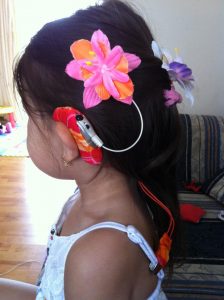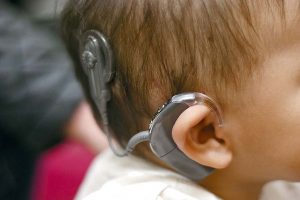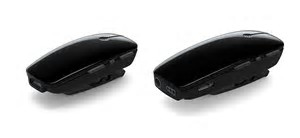I am lucky to be surrounded by people who out of kindness and curiosity want to know more about my two daughters cochlear implants.
My eldest daughter and youngest daughter were born profoundly deaf and wear bilateral cochlear implants. Whilst I am so happy and comfortable answering people questions about the cochlear implant and I feel very proud talking about how the Cochlear Implant has helped our girls and our family. I know that some parents of children with hearing technology find it hard to talk about or explain to someone about them. Especially those whom have never had experience with a cochlear implant user before.
In this post I am going to cover common questions I am asked, and tell you the best way that I answer them!
It is also a good idea to help your child address and answers these questions as they get older, as they are inevitably going to face the exact same interest from their peers.

Are you still a deaf person if you have a Cochlear Implant?
Yes.
Grace and Ava is and always will be a person who is deaf. A cochlear implant or hearing aid is not a cure for the hearing impairment problems. It’s similar to wearing glasses for bad eye sight. It will hopefully improve your hearing, but once they are removed, the level or hearing returns to its natural level. In our girls case, there hearing loss is profound -meaning they can’t hear anything without their cochlear implants on, cant hear their own heart beat only feel very loud sounds via vibrations.
Was it an amazing moment when his Cochlear Implant was activated?
Of course when Grace’s Cochlear Implant was switched on nearly 6 years ago and Ava’s 3 years ago both, were really special days and will be etched on our minds has the cochlear implant has completely changed our lives. But they didn’t necessarily have an “amazing” reaction. A cochlear implant is turned on ever so quietly to begin with, especially for children, so their reaction is usually very subtle, if at all. Graces reaction was to cry and the first words she heard was her dad saying ‘hello, my beautiful little sweetpea’ Avas’ reaction was a smile the biggest smile a toddler could muster.

Does a Cochlear Implant work immediately?
Not necessarily. When someone first has their cochlear implant switched on it is pretty much the very start of stimulating the hearing nerve and it takes a long time to “wake” that nerve up. It is almost like training it to be able to hear which can take weeks and even months to start translating into sound.
What does it sound like through a Cochlear Implant?
It is so difficult for us with natural hearing to describe what life sounds like for them as the girls have nothing to compare it to. If someone has lost their hearing previous to getting a cochlear implant they may be able to tell you the difference. A lot of those people say that at first everyone and everything sounds very high pitched – like Mickey Mouse – but that after a while their brain adapts and it sounds very similar to their old hearing. The sounds have been described by Grace after the mickey mouse sounds has calmed down slightly that it can be described as robotic.
Will they always need to wear a Cochlear Implant?
A cochlear implant doesn’t cure deafness, so yes, Grace and Ava will always need to wear their cochlear implants if they wants to be able to hear. Technology is advancing though, so I’m sure their devices will become smaller and even more efficient with every upgrade. The newer implants are starting to be connected to IPhones to stream music and telephone calls directly into the recipients cochlear implant to help improve clarity.
Will they need to have more Surgery?
Hopefully not. The device is life-proof so the internal part will stay the same. Sometimes, like any electrical device, they can fail though, which would require more surgery. Ava, our youngest daughter her magnet had moved, we are still not a 100% sure why this had happened however, she required surgery to rectify this.
Can people with cochlear implants travel on a plane?
Yes of course! We always make sure to carry an ID card for both processors so that the security staff know what they do and why the metal detectors will go off. Most of the airports we have visited seem to know what a cochlear implant is and will bypass the girls and avoid going through the body scanner, we have to avoid these as they can wipe the map of the implant off, causing the implant to fail. So security who are aware tend to carry a pat down search. And a lesson learnt is to carry all the equipment you need in your hand luggage.
Can people with cochlear implants have a MRI scan?
At the moment with the girls implants they are not able to have an MRI scan because of the magnets in their skull, which can be affected by the MRI process. Talk to your audiologist or doctors if you have health questions like this.
Thank you to everyone that have ever taken an interest in our girls cochlear implants.





